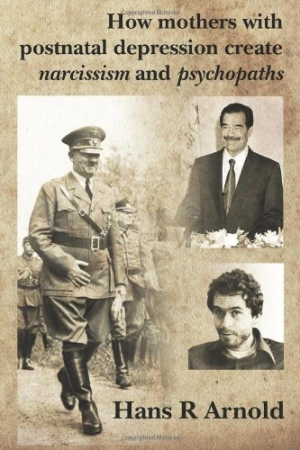How mothers with postnatal depression create narcissism and psychopaths
Arnold lays out his evidence that seeds of a mass murderer are planted from mom’s postnatal depression.
It’s a question equally likely to spark debate in college classrooms or around the workplace watercooler: how did Hitler become Hitler? Hans R Arnold believes he has found the answer in psychoanalytic theory. In How mothers with postnatal depression create narcissism and psychopaths, Arnold places the blame squarely on formative years spent in the care of a seriously depressed, emotionally inaccessible mother. It’s a bold claim, and it’s one that Arnold never shies away from in his unconventional and provocative reexamination of history and its most violent players.
Arnold’s theory is seductive in its simplicity. He suggests that children of seriously depressed mothers receive little or no emotional response from their main caregiver, so they are driven to behave more and more outrageously in order to provoke any response at all. This “narcissistic game” escalates over time as the child becomes “hooked” on evoking stronger reactions, often through forbidden behavior. As Arnold says, it’s easy to imagine “Klara, still deep in mourning for her dead children, almost unable to cope with the weight of her anguish, being unable to respond to (or even to meet) Adolf’s infant gaze.”
Arnold presents evidence for his theory within a structure that resembles authoritative psychological studies—he includes theory, case studies, and summation—but his argument is largely speculative. As he goes back in time to consider the childhoods of not only dictators like Hitler, but also serial killers like Ted Bundy and mass murderers like Anders Breivik, the subjectivity of his analyses becomes clear.
Arnold disregards other contributing factors, such as Hitler’s, Saddam Hussein’s, or Osama bin Laden’s abusive fathers, and he always returns to their mothers’ depression as the underlying cause of the psychopathological behavior. For instance, in Arnold’s view there is little question that Klara’s depression is at the heart of Adolf’s extreme narcissism; he dismisses Hitler’s father’s role, saying only, “It has often been surmised that Alois’s brutality shaped Hitler’s own mindset, something that I personally doubt.”
Arnold addresses some of the psychological literature on authoritarianism, taking an unusual perspective on Stanley Milgram’s classic experiments, for example, but does not include footnotes or a reference list. The decision to cite Brooke Shields’s celebrity memoir, Down Came the Rain, and popular psychologists like British television personality Oliver James, shed some doubt on the seriousness of his inquiry. One would expect more specific references to Freud and Jung, since Arnold’s work hinges on psychoanalytic theory, but these are sparse. Instead, Arnold gives ample space to repetitive summaries of varying length, and underdeveloped appendices like the one-paragraph treatment of violence in television and film.
How mothers with postnatal depression create narcissism and psychopaths presents a wide assortment of examples throughout history, up to and including such recent incidents as the Boston Marathon bombing of 2013. This currency helps to make Arnold’s treatise accessible to a general audience. He presents his ideas clearly, making it easy to understand his thesis, if not necessarily to agree with it. Blaming mothers is always a provocative move, and readers are likely to have a strong reaction to Arnold’s work. Let the debates begin.
Reviewed by
Sheila M. Trask
Disclosure: This article is not an endorsement, but a review. The publisher of this book provided free copies of the book and paid a small fee to have their book reviewed by a professional reviewer. Foreword Reviews and Clarion Reviews make no guarantee that the publisher will receive a positive review. Foreword Magazine, Inc. is disclosing this in accordance with the Federal Trade Commission’s 16 CFR, Part 255.

